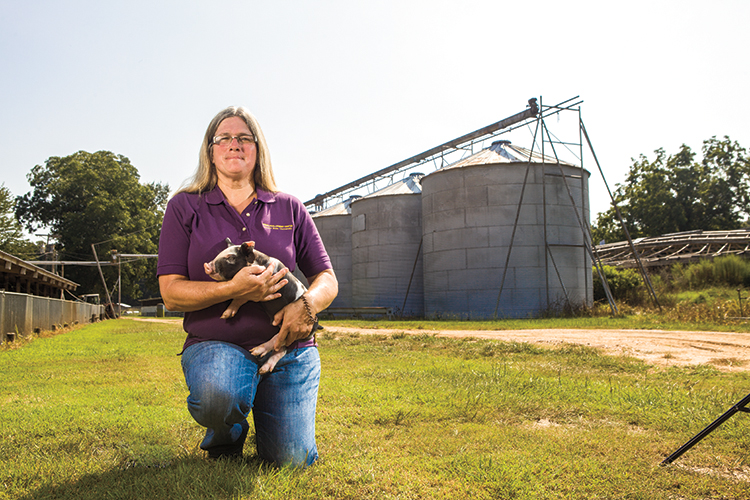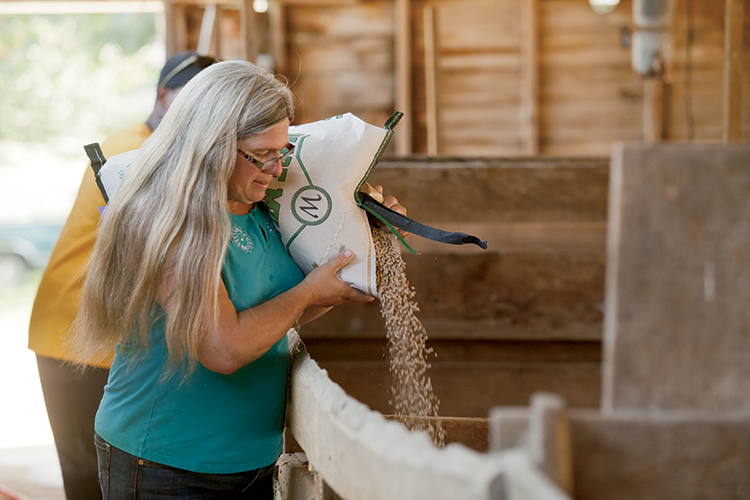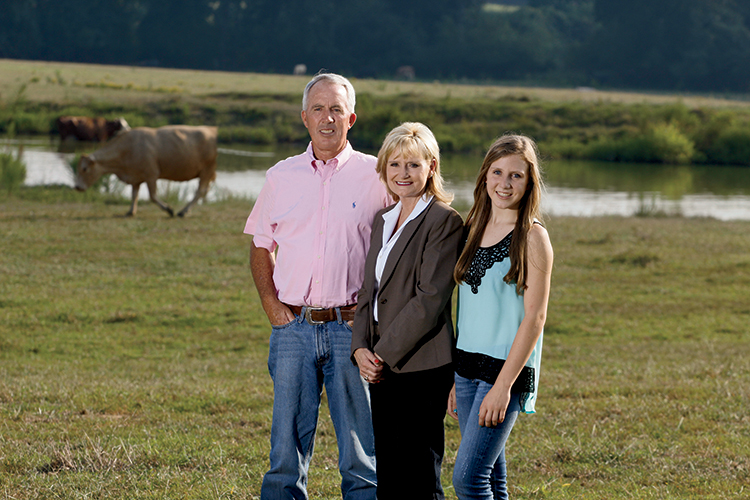Home > Mississippi > Mississippi Farm to Table > Making their Mark in Mississippi
Making their Mark in Mississippi
In partnership with: Mississippi Department of Agriculture and Commerce
 When visitors to Alcorn State University’s swine production unit drive onto the property, they often ask Libby St. Amant where to find the manager. “I love seeing their faces when I tell them I am the manager,” says St. Amant, of Union Church, who spent many years managing a dairy farm and working in animal research before taking her current post in 2011. “It’s intriguing, because men never expect to see a woman in my position – females aren’t supposed to know about these things. But once I start talking with them, they realize I know what I’m talking about.” St. Amant is one of many Mississippi women making valuable contributions to the agriculture industry and filling roles traditionally held by men. “Women bring a different perspective to agriculture because we don’t look at things the same way a man would,” St. Amant says. “Having spent more time on the consumer end of things and raising children, we bring new ideas to the table.” St. Amant grew up as one of six children on a beef cattle farm, so her appreciation for agriculture started young. “We were taught it was very important to produce livestock to help feed our nation,” she recalls. “It doesn’t matter how big or small you are – if you’re helping feed our nation, you’re important. That always stuck with me.”
When visitors to Alcorn State University’s swine production unit drive onto the property, they often ask Libby St. Amant where to find the manager. “I love seeing their faces when I tell them I am the manager,” says St. Amant, of Union Church, who spent many years managing a dairy farm and working in animal research before taking her current post in 2011. “It’s intriguing, because men never expect to see a woman in my position – females aren’t supposed to know about these things. But once I start talking with them, they realize I know what I’m talking about.” St. Amant is one of many Mississippi women making valuable contributions to the agriculture industry and filling roles traditionally held by men. “Women bring a different perspective to agriculture because we don’t look at things the same way a man would,” St. Amant says. “Having spent more time on the consumer end of things and raising children, we bring new ideas to the table.” St. Amant grew up as one of six children on a beef cattle farm, so her appreciation for agriculture started young. “We were taught it was very important to produce livestock to help feed our nation,” she recalls. “It doesn’t matter how big or small you are – if you’re helping feed our nation, you’re important. That always stuck with me.”  Mississippi’s first female Commissioner of Agriculture and Commerce, Cindy Hyde-Smith, also gained an appreciation for farmers early on. “I grew up in rural Mississippi, and I learned to drive on a Farmall Cub tractor,” Hyde-Smith says. “Every summer, my family filled our freezer with vegetables we planted, harvested and canned ourselves.” Hyde-Smith married fourth generation cattle farmer Michael Smith, and the couple’s 14-year-old daughter, Anna-Michael, plans to be the family’s fifth-generation farmer. “I feel very confident my daughter will have a future in agriculture, and her gender won’t be a deficit – it will be an asset,” Hyde-Smith says. Hyde-Smith was elected to the Mississippi Senate in 1999, where she served for 12 years and was chair of the Agriculture Committee. She made Mississippi history in January 2012 as the first woman to be elected to her current position. “People called my husband ‘senator’ many times, and he just smiled and said, ‘My wife is the senator,’ ” Hyde-Smith recalls. “As a woman, people want to question your knowledge and your ability, and that’s okay. I’m very comfortable in my skin and in my position.” As a senator, Hyde-Smith led the fight in the legislature to defend private property rights and pass a statewide referendum, which she called one of her proudest accomplishments.
Mississippi’s first female Commissioner of Agriculture and Commerce, Cindy Hyde-Smith, also gained an appreciation for farmers early on. “I grew up in rural Mississippi, and I learned to drive on a Farmall Cub tractor,” Hyde-Smith says. “Every summer, my family filled our freezer with vegetables we planted, harvested and canned ourselves.” Hyde-Smith married fourth generation cattle farmer Michael Smith, and the couple’s 14-year-old daughter, Anna-Michael, plans to be the family’s fifth-generation farmer. “I feel very confident my daughter will have a future in agriculture, and her gender won’t be a deficit – it will be an asset,” Hyde-Smith says. Hyde-Smith was elected to the Mississippi Senate in 1999, where she served for 12 years and was chair of the Agriculture Committee. She made Mississippi history in January 2012 as the first woman to be elected to her current position. “People called my husband ‘senator’ many times, and he just smiled and said, ‘My wife is the senator,’ ” Hyde-Smith recalls. “As a woman, people want to question your knowledge and your ability, and that’s okay. I’m very comfortable in my skin and in my position.” As a senator, Hyde-Smith led the fight in the legislature to defend private property rights and pass a statewide referendum, which she called one of her proudest accomplishments.  “Women are good at looking at the big picture. They can size things up and go into plan mode,” Hyde-Smith says. “Women also listen with their hearts. They’ve always played vital roles in agriculture. For every man on a tractor, there’s usually a woman who is the billpayer, the bookkeeper and the one who goes after parts.” Jan Holley turned part of her family’s corn, soybean and wheat farm in Fulton into an agritourism destination that opened to the public in 2008. Every fall, Holley Farms hosts thousands of visitors who spend hours exploring a corn maze, pumpkin patch, giant slides, corn cribs, farm animals and more. “My husband will tell you his quote was, ‘Nobody is going to pay money to come out to some old cornfield,’” Holley says. “But after the first year, he had to eat his words. For people who have never had the opportunity to live on a farm, it can be the adventure of a lifetime.” For Holley, the “ag-adventure” combines her two passions: farm life and education. “Telling the story of farm families is one of the best ways to improve the image of agriculture. I enjoy watching the eyes of children light up when they learn how everything they eat, drink and wear comes from a farm,” Holley says. “The public likes to know where their food comes from and how it is grown. Farmers, especially women, need to be that voice.”
“Women are good at looking at the big picture. They can size things up and go into plan mode,” Hyde-Smith says. “Women also listen with their hearts. They’ve always played vital roles in agriculture. For every man on a tractor, there’s usually a woman who is the billpayer, the bookkeeper and the one who goes after parts.” Jan Holley turned part of her family’s corn, soybean and wheat farm in Fulton into an agritourism destination that opened to the public in 2008. Every fall, Holley Farms hosts thousands of visitors who spend hours exploring a corn maze, pumpkin patch, giant slides, corn cribs, farm animals and more. “My husband will tell you his quote was, ‘Nobody is going to pay money to come out to some old cornfield,’” Holley says. “But after the first year, he had to eat his words. For people who have never had the opportunity to live on a farm, it can be the adventure of a lifetime.” For Holley, the “ag-adventure” combines her two passions: farm life and education. “Telling the story of farm families is one of the best ways to improve the image of agriculture. I enjoy watching the eyes of children light up when they learn how everything they eat, drink and wear comes from a farm,” Holley says. “The public likes to know where their food comes from and how it is grown. Farmers, especially women, need to be that voice.”



